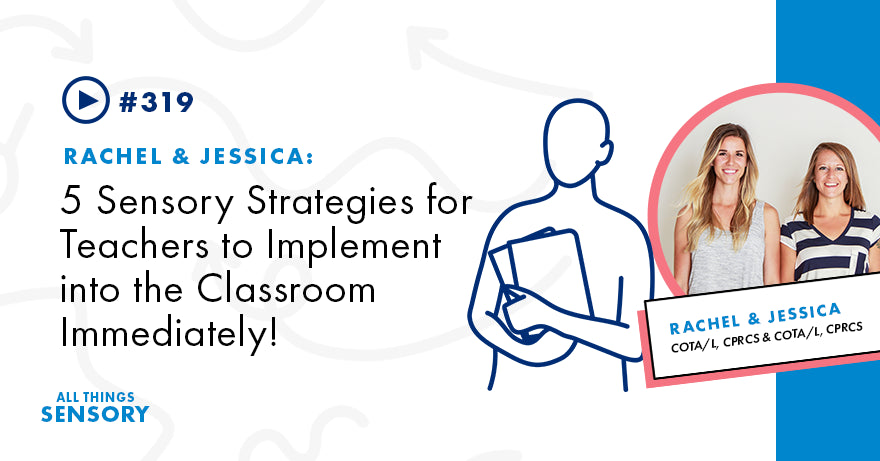Your Cart is Empty

School is almost here and we’re diving into 5 things that teachers can do in the classroom to help their students!
We talk about adaptive seating, using regular sensory breaks, finding different ways to establish natural consequences within the classroom, keeping recess, and more!
Improving Focus and Behavior in the Classroom Digital Course for Educators and Therapists
We’d love to answer your questions on the podcast! Fill out this form -> https://harkla.typeform.com/to/ItWxQNP3
All Things Sensory Podcast Instagram
Harkla Website - Shop Sensory Products!
Setting students up for success is a top priority as the new school year approaches. Implementing sensory strategies in the classroom can benefit all students, not just those who are sensory seekers or avoiders.
Here are five specific sensory strategies that can enhance the learning environment for everyone, including teachers.
Incorporating consistent sensory breaks throughout the day can benefit all students. These breaks help reset the brain and body, facilitating better focus and learning.
Sensory breaks can be used as transition activities between lessons, after recess, or even as students enter the classroom from a busy hallway. For younger students, integrating movement into lessons, such as bouncing a ball while spelling words or writing in shaving cream, and creating stations with different sensory activities can also enhance this approach.
Providing various seating options allows students to find what works best for their sensory needs. Options like therapy balls, wiggle seats, wobble chairs, standing desks, and foot fidgets can help students stay focused and comfortable.
For example, some classrooms have desks at different heights, allowing students to rotate between standing, sitting, and even lying on the floor. Adaptive seating should be available to all students, not just those with specific needs.
Teachers need to regulate their own sensory systems to support their students effectively. Modeling self-regulation strategies can create a positive learning environment.
Teachers can express their feelings and show how they cope with stress or overstimulation. Simple strategies such as drinking water, adjusting lighting, eating crunchy snacks, chewing gum, taking deep breaths, or doing a brief yoga sequence as a class can make a significant difference.
Sensory sticks are an easy and affordable tool to incorporate sensory activities into the classroom. Teachers can write different sensory activities on each stick using popsicle sticks, with arrows indicating whether the activity is alerting or calming.
When a sensory break is needed, simply picking a stick can provide a quick and effective way to reset. This method requires minimal preparation and can be fun for students to engage in sensory activities.
Recess is crucial for students' sensory and emotional regulation. While taking away recess can sometimes be a practical consequence, it is often detrimental to students who need that time to reset.
Alternative consequences should be considered for students who struggle with sensory issues or emotional regulation. Shortening recess instead of eliminating it or having students spend a few minutes with a teacher before joining their peers can be more effective.
Understanding the underlying sensory needs driving certain behaviors and addressing them is essential. By integrating these sensory strategies, teachers can create a more inclusive and supportive classroom environment that benefits all students.
BORING, BUT NECESSARY LEGAL DISCLAIMERS
While we make every effort to share correct information, we are still learning. We will double check all of our facts but realize that medicine is a constantly changing science and art. One doctor / therapist may have a different way of doing things from another. We are simply presenting our views and opinions on how to address common sensory challenges, health related difficulties and what we have found to be beneficial that will be as evidenced based as possible. By listening to this podcast, you agree not to use this podcast as medical advice to treat any medical condition in either yourself or your children. Consult your child’s pediatrician/ therapist for any medical issues that he or she may be having. This entire disclaimer also applies to any guests or contributors to the podcast. Under no circumstances shall Rachel Harrington, Harkla, Jessica Hill, or any guests or contributors to the podcast, as well as any employees, associates, or affiliates of Harkla, be responsible for damages arising from use of the podcast.
Keep in mind that we may receive commissions when you click our links and make purchases. However, this does not impact our reviews and comparisons. We try our best to keep things fair and balanced, in order to help you make the best choice for you.
This podcast should not be used in any legal capacity whatsoever, including but not limited to establishing “standard of care” in a legal sense or as a basis for expert witness testimony. No guarantee is given regarding the accuracy of any statements or opinions made on the podcast.
Comments will be approved before showing up.